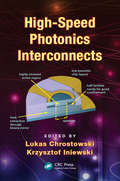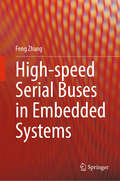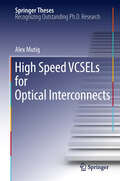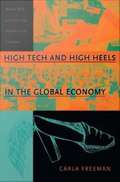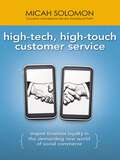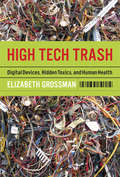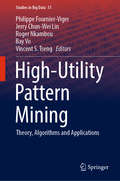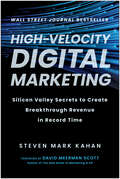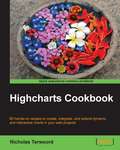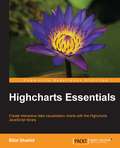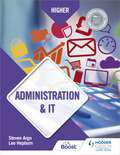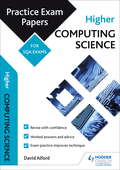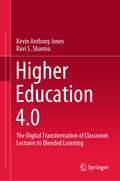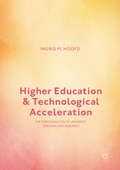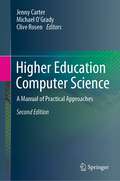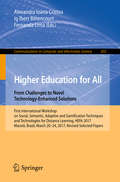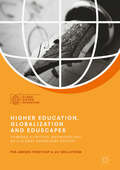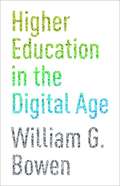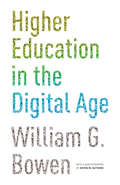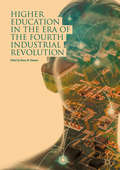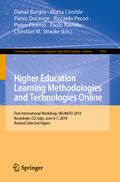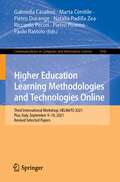- Table View
- List View
High-Speed Photonics Interconnects (Devices, Circuits, and Systems #13)
by Krzysztof Iniewski Lukas ChrostowskiDramatic increases in processing power have rapidly scaled on-chip aggregate bandwidths into the Tb/s range. This necessitates a corresponding increase in the amount of data communicated between chips, so as not to limit overall system performance. To meet the increasing demand for interchip communication bandwidth, researchers are investigating the use of high-speed optical interconnect architectures. Unlike their electrical counterparts, optical interconnects offer high bandwidth and negligible frequency-dependent loss, making possible per-channel data rates of more than 10 Gb/s. High-Speed Photonics Interconnects explores some of the groundbreaking technologies and applications that are based on photonics interconnects. From the Evolution of High-Speed I/O Circuits to the Latest in Photonics Interconnects Packaging and Lasers Featuring contributions by experts from academia and industry, the book brings together in one volume cutting-edge research on various aspects of high-speed photonics interconnects. Contributors delve into a wide range of technologies, from the evolution of high-speed input/output (I/O) circuits to recent trends in photonics interconnects packaging. The book discusses the challenges associated with scaling I/O data rates and current design techniques. It also describes the major high-speed components, channel properties, and performance metrics. The book exposes readers to a myriad of applications enabled by photonics interconnects technology. Learn about Optical Interconnect Technologies Suitable for High-Density Integration with CMOS Chips This richly illustrated work details how optical interchip communication links have the potential to fully leverage increased data rates provided through complementary metal-oxide semiconductor (CMOS) technology scaling at suitable power-efficiency levels. Keeping the mathematics to a minimum, it gives engineers, researchers, graduate students, and entrepreneurs a comprehensive overview of the dynamic landscape of high-speed photonics interconnects.
High-speed Serial Buses in Embedded Systems
by Feng ZhangThis book describes the most frequently used high-speed serial buses in embedded systems, especially those used by FPGAs. These buses employ SerDes, JESD204, SRIO, PCIE, Aurora and SATA protocols for chip-to-chip and board-to-board communication, and CPCIE, VPX, FC and Infiniband protocols for inter-chassis communication. For each type, the book provides the bus history and version info, while also assessing its advantages and limitations. Furthermore, it offers a detailed guide to implementing these buses in FPGA design, from the physical layer and link synchronization to the frame format and application command. Given its scope, the book offers a valuable resource for researchers, R&D engineers and graduate students in computer science or electronics who wish to learn the protocol principles, structures and applications of high-speed serial buses.
High Speed VCSELs for Optical Interconnects
by Alex MutigThe transmission speed of data communication systems is forecast to increase exponentially over the next decade. Development of both Si-based high-speed drivers as well as III-V-semiconductor-based high-speed vertical cavity surface emitting lasers (VCSELs) are prerequisites for future ultrahigh data-rate systems. This thesis presents: - a survey of the present state of the art of VCSELs - a systematic investigation of the various effects limiting present VCSELs - a catalogue of solutions to overcome present limits - detailed progress in modelling, fabricating and testing the currently most advanced VCSELs at the two commercially most important wavelengths.
High Tech and High Heels in the Global Economy: Women, Work, and Pink-Collar Identities in the Caribbean
by Carla FreemanHigh Tech and High Heels in the Global Economy is an ethnography of globalization positioned at the intersection between political economy and cultural studies. Carla Freeman's fieldwork in Barbados grounds the processes of transnational capitalism--production, consumption, and the crafting of modern identities--in the lives of Afro-Caribbean women working in a new high-tech industry called "informatics. " It places gender at the center of transnational analysis, and local Caribbean culture and history at the center of global studies. Freeman examines the expansion of the global assembly line into the realm of computer-based work, and focuses specifically on the incorporation of young Barbadian women into these high-tech informatics jobs. As such, Caribbean women are seen as integral not simply to the workings of globalization but as helping to shape its very form. Through the enactment of "professionalism" in both appearances and labor practices, and by insisting that motherhood and work go hand in hand, they re-define the companies' profile of "ideal" workers and create their own "pink-collar" identities. Through new modes of dress and imagemaking, the informatics workers seek to distinguish themselves from factory workers, and to achieve these new modes of consumption, they engage in a wide array of extra income earning activities. Freeman argues that for the new Barbadian pink-collar workers, the globalization of production cannot be viewed apart from the globalization of consumption. In doing so, she shows the connections between formal and informal economies, and challenges long-standing oppositions between first world consumers and third world producers, as well as white-collar and blue-collar labor. Written in a style that allows the voices of the pink-collar workers to demonstrate the simultaneous burdens and pleasures of their work, High Tech and High Heels in the Global Economy will appeal to scholars and students in a wide range of disciplines, including anthropology, cultural studies, sociology, women's studies, political economy, and Caribbean studies, as well as labor and postcolonial studies.
High Tech Heretic: Why Computers Don't Belong in the Classroom and Other Reflections by a Computer Contrarian
by Clifford StollInteresting analysis of the use and misuse of technology in education.
High-Tech, High-Touch Customer Service: Inspire Timeless Loyalty in the Demanding New World of Social Commerce
by Micah SolomonToday's customers are a hard bunch to crack. Time-strapped, screen-addicted, value-savvy, and socially engaged, their expectations are tougher than ever for a business to keep up with. They are empowered like never before and expect businesses to respect that sense of empowermentùlashing out at those that don't. Take heart: Old-fashioned customer service, fully retooled for today's blistering pace and digitally connected reality, is what you need to build the kind loyal customer base that allows you to surviveùand thrive. And High-Tech, High-Touch Customer Service spells out surefire strategies for success in a clear, entertaining, and practical way. Discover: ò Six major customer trends and what they mean for your business ò Eight unbreakable rules for social media customer service ò How to effectively address online complainers and saboteurs on Yelp, Twitter, TripAdvisor, and other forums for user generated content ò The rising power of self-serviceùand how to design it properly ò How to build a company culture that breeds stellar customer service High-Tech, High-Touch Customer Service reveals inside secrets of wildly successful customer service initiatives, from Internet startups to venerable brands, and shows how companies of every stripe can turn casual customers into fervent supporters who will spread the word far and wideùonline and off.
High Tech Trash: Digital Devices, Hidden Toxics, and Human Health
by Elizabeth GrossmanThe Digital Age was expected to usher in an era of clean production, an alternative to smokestack industries and their pollutants. But as environmental journalist Elizabeth Grossman reveals in this penetrating analysis of high tech manufacture and disposal, digital may be sleek, but it's anything but clean. Deep within every electronic device lie toxic materials that make up the bits and bytes, a complex thicket of lead, mercury, cadmium, plastics, and a host of other often harmful ingredients.High Tech Trash is a wake-up call to the importance of the e-waste issue and the health hazards involved. Americans alone own more than two billion pieces of high tech electronics and discard five to seven million tons each year. As a result, electronic waste already makes up more than two-thirds of the heavy metals and 40 percent of the lead found in our landfills. But the problem goes far beyond American shores, most tragically to the cities in China and India where shiploads of discarded electronics arrive daily. There, they are "recycled"-picked apart by hand, exposing thousands of workers and community residents to toxics.As Grossman notes, "This is a story in which we all play a part, whether we know it or not. If you sit at a desk in an office, talk to friends on your cell phone, watch television, listen to music on headphones, are a child in Guangdong, or a native of the Arctic, you are part of this story."The answers lie in changing how we design, manufacture, and dispose of high tech electronics. Europe has led the way in regulating materials used in electronic devices and in e-waste recycling. But in the United States many have yet to recognize the persistent human health and environmental effects of the toxics in high tech devices. If Silent Spring brought national attention to the dangers of DDT and other pesticides, High Tech Trash could do the same for a new generation of technology's products.
High-Throughput Metabolomics: Methods and Protocols (Methods in Molecular Biology #1978)
by Angelo D'AlessandroThis detailed volume focuses on recent technological, computational, and biostatistical advances in the field of high-throughput metabolomics. Chapters encompass methods, platforms, and analytical strategies for steady state measurements and metabolic flux analysis with stable isotope-labeled tracers, in biological matrices of clinical relevance and model organisms. Mass spectrometry-based or orthogonal methods are discussed, along with computational and statistical methods to address data sparsity in high-throughput metabolomics approaches. As a part of the highly successful Methods in Molecular Biology series, chapters include introductions to their respective topics, lists of the necessary materials and reagents, step-by-step, readily reproducible laboratory protocols, and tips on troubleshooting and avoiding known pitfalls. Authoritative and practical, High-Throughput Metabolomics: Methods and Protocols provides tools that can bring about the next generation of clinical biochemistry in a cost-effective, rigorous fashion, exponentially advancing our capacity to investigate nature while hastening the advent of personalized medicine.
High-Utility Pattern Mining: Theory, Algorithms and Applications (Studies in Big Data #51)
by Philippe Fournier-Viger Jerry Chun-Wei Lin Roger Nkambou Bay Vo Vincent S. TsengThis book presents an overview of techniques for discovering high-utility patterns (patterns with a high importance) in data. It introduces the main types of high-utility patterns, as well as the theory and core algorithms for high-utility pattern mining, and describes recent advances, applications, open-source software, and research opportunities. It also discusses several types of discrete data, including customer transaction data and sequential data.The book consists of twelve chapters, seven of which are surveys presenting the main subfields of high-utility pattern mining, including itemset mining, sequential pattern mining, big data pattern mining, metaheuristic-based approaches, privacy-preserving pattern mining, and pattern visualization. The remaining five chapters describe key techniques and applications, such as discovering concise representations and regular patterns.
High-Velocity Digital Marketing: Silicon Valley Secrets to Create Breakthrough Revenue in Record Time
by Steven Mark KahanHigh-Velocity Digital Marketing provides B2B sales and marketing teams with a blueprint for quickly accelerating revenue growth67 percent of B2B buyers no longer prefer to interact with sales representatives when making purchasing decisions. Gathering information online is now the hallmark of the buying process. During his 30+ year career, Steven Mark Kahan has developed a digital marketing blueprint that helps companies quickly increase revenue in brutally competitive markets. In High-Velocity Digital Marketing, he lays out how you can: Set in motion a modern marketing strategy to dramatically increase revenue growth in record timeCreate content that resonates with your ideal target customersDrive more visitors to your website without paying for adsBuild digital demand generation campaigns that quickly deliver more leads, sales pipeline, and revenueImprove your website to convert at least 5 percent of traffic to leadsLeverage public relations so it contributes to revenue growthSynchronize your sales and marketing teams in order to close prospects faster and at a higher rate Marketing online is no longer one of the ways to market—it is the way to do marketing. High-Velocity Digital Marketing is your essential, easy-to-implement guide to getting found online, providing the most critical information, and getting your buyers to purchase—fast.
Highcharts Cookbook
by Nicholas TerwoordAn easy-to-follow, step-by-step guide with over 80 recipes covering examples on how to use and create dynamic charts with Highcharts. "Highcharts Cookbook" is intended for JavaScript developers or other web programmers looking to add charting functionality to their web applications. Some familiarity with web application development would be helpful but is not required.
Highcharts Essentials
by Bilal ShahidIf you are a web developer with a basic knowledge of HTML, CSS, and JavaScript and want to quickly get started with this web charting technology, this is the book for you. This book will also serve as an essential guide to those who have probably used a similar library and are now looking at migrating to Highcharts.
Higher Administration & IT
by Steven Argo Lee HepburnTrust our authors - whose students have achieved 100% A-C grades in Higher Admin since 2018 - to build your confidence and boost your grade.Easy to understand and enjoyable to read, this textbook takes you through all the theoretical content and practical skills, with over 60 accompanying digital tasks provided free online.> Learn and remember every topic. Simple explanations ensure that you have strong knowledge of administrative theory. Real-life case studies with differentiated exam-style questions help to check understanding before you move on.> Gain skills for the future. Digital literacy, organisational and management skills are developed throughout the course. The authors also focus on problem-solving skills, to set you up for success in the workplace.> Put skills into practice. Follow clear, step-by-step guides to using spreadsheets, databases, word processing, presentations, emails and e-diary. Apply your skills to over 60 digital tasks, which are available free online.> Prepare for assessment. 'What you should know' checklists and study activities at the end of each chapter are useful revision tools. A practice exam paper and answers are included in the book, and a practice assignment is provided online, with a full marking scheme.
Higher Administration & IT
by Steven Argo Lee HepburnTrust our authors - whose students have achieved 100% A-C grades in Higher Admin since 2018 - to build your confidence and boost your grade.Easy to understand and enjoyable to read, this textbook takes you through all the theoretical content and practical skills, with over 60 accompanying digital tasks provided free online.> Learn and remember every topic. Simple explanations ensure that you have strong knowledge of administrative theory. Real-life case studies with differentiated exam-style questions help to check understanding before you move on.> Gain skills for the future. Digital literacy, organisational and management skills are developed throughout the course. The authors also focus on problem-solving skills, to set you up for success in the workplace.> Put skills into practice. Follow clear, step-by-step guides to using spreadsheets, databases, word processing, presentations, emails and e-diary. Apply your skills to over 60 digital tasks, which are available free online.> Prepare for assessment. 'What you should know' checklists and study activities at the end of each chapter are useful revision tools. A practice exam paper and answers are included in the book, and a practice assignment is provided online, with a full marking scheme.
Higher Computing Science: HCOMPPEP
by David AlfordPractise for your SQA exams with three specially-commissioned Hodder Gibson Practice Exam Papers.- Practise with model papers written and checked by experienced markers and examiners- Get extra advice with specially-written study-skills guidance sections- Gain vital extra marks and avoid common mistakes with examiner tips
Higher Education 4.0: The Digital Transformation of Classroom Lectures to Blended Learning
by Kevin Anthony Jones Sharma RavishankarThis book chronicles a 10-year introduction of blended learning into the delivery at a leading technological university, with a longstanding tradition of technology-enabled teaching and learning, and state-of-the-art infrastructure. Hence, both teachers and students were familiar with the idea of online courses. Despite this, the longitudinal experiment did not proceed as expected. Though few technical problems, it required behavioural changes from teachers and learners, thus unearthing a host of socio-technical issues, challenges, and conundrums. With the undercurrent of design ideals such as “tech for good”, any industrial sector must examine whether digital platforms are credible substitutes or at best complementary. In this era of Industry 4.0, higher education, like any other industry, should not be about the creative destruction of what we value in universities, but their digital transformation. The book concludes with an agenda for large, repeatable Randomised Controlled Trials (RCTs) to validate digital platforms that could fulfil the aspirations of the key stakeholder groups – students, faculty, and regulators as well as delving into the role of Massive Open Online Courses (MOOCs) as surrogates for “fees-free” higher education and whether the design of such a HiEd 4.0 platform is even a credible proposition. Specifically, the book examines the data-driven evidence within a design-based research methodology to present outcomes of two alternative instructional designs evaluated – traditional lecturing and blended learning. Based on the research findings and statistical analysis, it concludes that the inexorable shift to online delivery of education must be guided by informed educational management and innovation.
Higher Education and Technological Acceleration: The Disintegration of University Teaching and Research
by Ingrid M. HoofdThis book critically examines the relationship between new media technologies, research ethics, and pedagogical strategies within the contemporary university. It debates whether recent transformations of higher education, rather than an effect of neo-liberalization, are actually an outflow of the technological acceleration of the university's own contradictory ideals around knowledge and democracy. The book sets up this argument by likening the university to a "vision machine" which quest for total scientific and social transparency has recently caved in on itself, negatively affecting staff and student well-being. The book asserts that this situation reveals the essential tension at the heart of the university system, and explores the acceleration of this tension by analyzing a variety of teaching and research advances from Europe and Asia. Examining among other issues the call for creativity and critical thinking in the curriculum, the push for e-learning, and the advent of the digital humanities, this text offers a key analysis of the university's founding ideals and its constitutive relationship to technological acceleration.
Higher Education Computer Science: A Manual of Practical Approaches
by Jenny Carter Michael O’Grady Clive RosenThe march towards on-line and blended teaching—present before the Covid-19 pandemic—has been accelerated by it, and there is no going back. Students and staff may object, but the economic drive towards “greater productivity” will inevitably result in less face-to-face (f2f) instruction. Therefore, it is incumbent for those delivering this precious, in-person resource to make maximum use of time…which raises the question, “how”?The second edition of Higher Education Computer Science offers some potential answers. It also addresses other questions, such as “why have f2f teaching at all?” “what is the purpose of f2f?” and “what is the appropriate balance between the two?” The first edition began to offer suggestions for optimising limited opportunities to get together with students. Aligned with that, this unique new volume examines how to use the technology available to maximum advantage: For example, resources such as Moocs and other on-line instructional materials can provide invaluable pedagogic support. In addition, the book addresses ‘problem-based learning,’ using robotics in the teaching of programming, and a multidisciplinary approach to data science. Although it includes a chapter on distance learning, there is greater emphasis placed on the soft, transferable skills and employability skills that are best delivered in person. Further, the work provides several examples of putting theory into practice when teaching computer science at both undergraduate and postgraduate levels. Written by experienced practitioners, each chapter tackles a particular teaching activity or topic within computing, presented in such a way that other practitioners can use. As such, this new volume will be an invaluable resource to those who want to protect and optimise in-person teaching.
Higher Education for All. From Challenges to Novel Technology-Enhanced Solutions: First International Workshop On Social, Semantic, Adaptive And Gamification Techniques And Technologies For Distance Learning, Hefa 2017, Maceió, Brazil, March 20-24, 2017, Revised Selected Papers (Communications In Computer And Information Science #832)
by Alexandra Ioana Cristea Ig Ibert Bittencourt Fernanda LimaThis book constitutes the thoroughly refereed proceedings of the Researcher Links Workshop: Higher Education for All, held in Maceió, Brazil, in March 2017. The 12 full papers presented were carefully reviewed and selected from 31 submissions. The papers deal with a large spectrum of topics, including higher education, technology-enhanced solutions, user modelling, user grouping, gamification, educational games, MOOCs, e-learning, open educational resources, collaborative learning, student modelling, serious games, language analysis.
Higher Education, Globalization and Eduscapes: Towards A Critical Anthropology Of A Global Knowledge Society (Palgrave Studies in Global Higher Education)
by Per-Anders Forstorp Ulf MellströmThis book examines transnational scapes and flows of higher education: arguing that the educational and political vision of a national, regional and global knowledge society needs to be perspectivized beyond its ethnocentric conditions and meanings. Using eduscapes as its most important concept, this book explores the educational landscapes of individual as well as institutional actors; particularly the agential aspects of how global eduscapes are imagined, experienced, negotiated and constructed. In addition, the authors highlight the critical potential of anthropology, using this perspective as a resource for cultural critique where the Western experience and assumed ‘ownership’ of the global knowledge economy will be put into question. This comprehensive book will appeal to students and scholars of educational policy, the sociology of education and the globalization of education.
Higher Education in the Digital Age
by William G. BowenTwo of the most visible and important trends in higher education today are its exploding costs and the rapid expansion of online learning. Could the growth in online courses slow the rising cost of college and help solve the crisis of affordability? In this short and incisive book, William G. Bowen, one of the foremost experts on the intersection of education and economics, explains why, despite his earlier skepticism, he now believes technology has the potential to help rein in costs without negatively affecting student learning. As a former president of Princeton University, an economist, and author of many books on education, including the acclaimed bestseller The Shape of the River, Bowen speaks with unique expertise on the subject.Surveying the dizzying array of new technology-based teaching and learning initiatives, including the highly publicized emergence of "massive open online courses" (MOOCs), Bowen argues that such technologies could transform traditional higher education--allowing it at last to curb rising costs by increasing productivity, while preserving quality and protecting core values. But the challenges, which are organizational and philosophical as much as technological, are daunting. They include providing hard evidence of whether online education is cost-effective in various settings, rethinking the governance and decision-making structures of higher education, and developing customizable technological platforms. Yet, Bowen remains optimistic that the potential payoff is great.Based on the 2012 Tanner Lectures on Human Values, delivered at Stanford University, the book includes responses from Stanford president John Hennessy, Harvard University psychologist Howard Gardner, Columbia University literature professor Andrew Delbanco, and Coursera cofounder Daphne Koller.
Higher Education in the Digital Age
by Kevin M. Guthrie William G. BowenTwo of the most visible and important trends in higher education today are its exploding costs and the rapid expansion of online learning. Could the growth in online courses slow the rising cost of college and help solve the crisis of affordability? In this short and incisive book, William G. Bowen, one of the foremost experts on the intersection of education and economics, explains why, despite his earlier skepticism, he now believes technology has the potential to help rein in costs without negatively affecting student learning. As a former president of Princeton University, an economist, and author of many books on education, including the acclaimed bestseller The Shape of the River, Bowen speaks with unique expertise on the subject. Surveying the dizzying array of new technology-based teaching and learning initiatives, including the highly publicized emergence of "massive open online courses" (MOOCs), Bowen argues that such technologies could transform traditional higher education--allowing it at last to curb rising costs by increasing productivity, while preserving quality and protecting core values. But the challenges, which are organizational and philosophical as much as technological, are daunting. They include providing hard evidence of whether online education is cost-effective in various settings, rethinking the governance and decision-making structures of higher education, and developing customizable technological platforms. Yet, Bowen remains optimistic that the potential payoff is great. Based on the 2012 Tanner Lectures on Human Values, delivered at Stanford University, the book includes responses from Stanford president John Hennessy, Harvard University psychologist Howard Gardner, Columbia University literature professor Andrew Delbanco, and Coursera cofounder Daphne Koller.
Higher Education in the Era of the Fourth Industrial Revolution
by Nancy W. GleasonThis open access collection examines how higher education responds to the demands of the automation economy and the fourth industrial revolution. Considering significant trends in how people are learning, coupled with the ways in which different higher education institutions and education stakeholders are implementing adaptations, it looks at new programs and technological advances that are changing how and why we teach and learn. The book addresses trends in liberal arts integration of STEM innovations, the changing role of libraries in the digital age, global trends in youth mobility, and the development of lifelong learning programs. This is coupled with case study assessments of the various ways China, Singapore, South Africa and Costa Rica are preparing their populations for significant shifts in labour market demands – shifts that are already underway. Offering examples of new frameworks in which collaboration between government, industry, and higher education institutions can prevent lagging behind in this fast changing environment, this book is a key read for anyone wanting to understand how the world should respond to the radical technological shifts underway on the frontline of higher education.
Higher Education Learning Methodologies and Technologies Online: First International Workshop, HELMeTO 2019, Novedrate, CO, Italy, June 6-7, 2019, Revised Selected Papers (Communications in Computer and Information Science #1091)
by Daniel Burgos Marta Cimitile Pietro Ducange Riccardo Pecori Pietro Picerno Paolo Raviolo Christian M. StrackeThis book constitutes the thoroughly refereed post-conference proceedings of the First International Workshop on Higher Education Learning Methodologies and Technologies Online, HELMeTO 2019, held in Novedrate, Italy, in June 2019. The 15 revised full papers and 2 short papers presented were carefully reviewed and selected from a total of 39 submissions. The papers are organized in topical sections on online pedagogy and learning methodologies; learning technologies, data analytics and educational big data mining as well as their applications; the challenge of online sport and exercise sciences university programs.
Higher Education Learning Methodologies and Technologies Online: Third International Workshop, HELMeTO 2021, Pisa, Italy, September 9–10, 2021, Revised Selected Papers (Communications in Computer and Information Science #1542)
by Gabriella Casalino Marta Cimitile Pietro Ducange Natalia Padilla Zea Riccardo Pecori Pietro Picerno Paolo RavioloThis book constitutes the thoroughly refereed post-conference proceedings of the Third International Workshop on Higher Education Learning Methodologies and Technologies Online, HELMeTO 2021, held in Pisa, Italy, in September 2021. Due to the COVID-19 pandemic the conference was held online. The 26 revised full papers and 3 short papers presented were carefully reviewed and selected from a total of 65 submissions. The papers present recent research on challenges of implementing emerging technology solution for online, online learning pedagogical frameworks, facing COVID19 emergency in higher education teaching and learning, online learning technologies in practice, online learning strategies and resources, etc.
